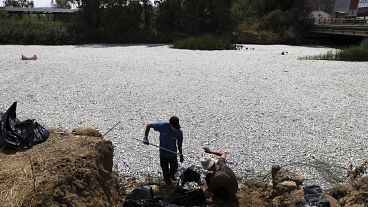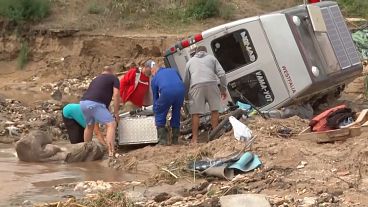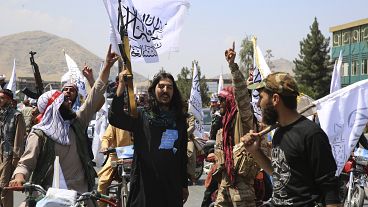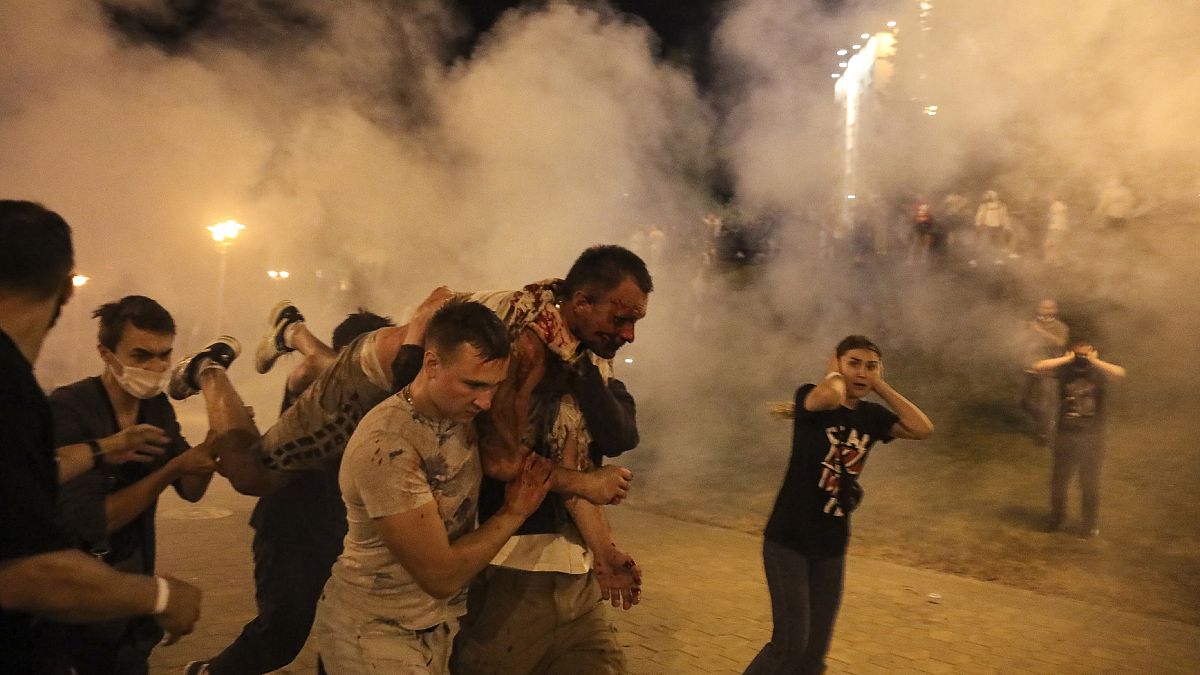One month on from the disputed August 9 election in Belarus, Emil Filtenborg tells Euronews how he expected some violence, but never anticipated it would be "this brutal, this early."
One month on from the, now historic, disputed election of August 9 2020, Euronews asks Journalist Emil Filtenborg to tell the story of his and his colleague Stefan Weichert's reporting of what is now something the whole world is watching.
On the evening of August 9, I was running from riot police.
My colleague Stefan and me were in Belarus to cover the presidential elections for Euronews. Exit polls predicting a landslide victory for incumbent President Alexander Lukashenko had just been released prompting thousands to pour into the streets of capital Minsk in protest.
The authorities responded with a crackdown of unprecedented force.
August 9
That night, after dodging riot police for 20 minutes, we were pushed into a staircase leading to a backstreet. That is when we heard the first three stun grenades that kickstarted four days of violent crackdowns on peaceful protesters.
The grenades went off at the bottom of the staircase with a thundering crack that made our ears ring for minutes and impaired Stefan's vision for some time.
As the sound of police truncheons hammering down on protesters down on the main street reached us, we fled into a parallel street, following a group of panic eyed and disoriented protesters. Our priority was making it back to the demonstration so we could start interviewing people and get an overview of the events.
We had people in place doing welfare checks, we did a risk assessment, and we had planned as best we could to find exit routes out of the protest. We had also prepared for violence from the authorities but we never expected it to be this brutal, this early.
Our plans of getting into the demonstration to secure information and interviews were thrown out the window after the flashbangs rang out. It was our second plan to be quickly derailed as we had initially hoped to follow a protester but we were barred from reaching his place by police.
Instead, we circled around for a while but eventually made it back to the protest by carefully avoiding empty main streets and areas with only one or two exit points.
Usually, we would have checked for information on Twitter, but the internet was down and so we were walking, virtually, blind.
When we finally made it back to where the main demonstration was taking place, a young woman — I doubt she was even 18 yet — tried to hug me when I introduced myself as a Danish journalist.
"Thank you for coming," she said with tears in her eyes. The gesture was interrupted, as people started running from a new push from the riot police.
We followed the protest for a couple of kilometres until a line of busses full of riot police separated us from the protestors. We decided to call it a night.
We sneaked back to the hotel, inconveniently located right where the protests started. We crossed the road, carefully avoiding a pool of blood on the pavement, and walked past two police officers assessing damage to the road. If they had asked for ID, we would most likely have been deported that night.
We slept for two hours and got up early to find a place with Wi-Fi to send our report.
Violence continues
The following two days, we didn’t go to the protests.
Every afternoon OMON (a Special Police Unit) would set up right outside the hotel, and walking out with a camera and two Danish passports would only have scored us a ride on the dreaded riot police busses.
We monitored the street from our hotel windows and we could see that although people could usually walk unhindered during the day, as the hours passed, OMON would start arresting people.
By then, protesters arrested that first night were starting to be released from detention centres and so we switched our focus to the victims of police violence.
Our first interview was a teenager who, upon being released from detention, find out that his parents had also been arrested as they were looking for him. We talked to the entire family when they were reunited. They were perfectly ordinary people who showed a touching degree of fortitude.
Stefan also visited a longtime activist, who had made it out of jail. She had just spent 30 days in solitary confinement under appalling conditions.
Beers, sandwiches and dirty underwear
Initially, the staff at our hotel were very forthcoming. Some even expressed gratitude because we were there to report on the events unfolding. However, three days after the election, the mood started to change.
Stefan received a call from reception, asking us to come down to settle the bill even though we were booked for three more nights. When we got down, the staff avoided eye contact.
When Stefan later went out to pick up dinner, he noticed a man with sunglasses talking to the hotel's two security guards. He immediately left out the front door when he saw my colleague, while the receptionist looked down at the desk.
Stefan had to go in the same direction as the unidentified man, who, upon passing a nearby café, nodded to another man sitting alone on the terrace prompting him to zero-in on Stefan.
Soon after, Stefan called me to warn me that something was wrong. I didn’t fully understand why he was so sure, but I know my colleague well enough to trust him in these situations.
Stefan proceeded as if nothing was the matter while I started packing. On his return trip, the man at the café immediately placed a call upon seeing him, and so minutes after Stefan had reached the hotel, we left out of the back entrance.
The next day, the Belarus secret service started raiding hotels downtown and even arresting some journalists. If they had raided our hotel, all they would have found were beer cans, uneaten sandwiches and dirty underwear.
Goodbye, Minsk
With our editor, we decided that it was time for us to leave. We went to the airport on Thursday night, five days after the election. Stefan kept saying it was a mistake, and I kept asking him to shut up because I knew he was right. At the time, it looked like Lukashenko might fall at any minute.
As I was following the news on Twitter and Telegram, I kept thinking of the young girl thanking me for being there.
I called Stefan and asked if he had any plans the following day. He said no. I asked if he wanted to take a short trip to Belarus. He said yes. We booked a flight for Minsk and landed in the morning after 36 hours or so back home.
This time we moved to an apartment instead of a hotel. We continued working with a mix of reports from the protests that had now turned less violent and interviews with people ranging from volunteers teaching protesters first aid to state-employed journalists leaving their jobs.
On Sunday, the day after we entered the country a second time, we went to a protest at the location where it all began. Around 200,000 people showed up in the most massive demonstration the country had ever seen.
Though still fearful, the mood was hopeful, almost festive. It was surreal to think that this happened only a week after the election day protests. Nothing and everything had simultaneously changed.
On edge
We were already on edge after what we figured to be a close call in the hotel. When we saw someone running for the bus or heard a balloon pop, our first instinct was to flee. The stun grenades and the rubber bullets, for me at least, are not the worst part — it is the constant being on guard that drains you.
We were not the only ones being a bit jumpy. A lot of the sources we spoke to wanted anonymity, which we often agreed on. We were writing all our articles without putting our names on them because we did not want the attention.
The Belarusians we spoke to risked detention and the beatings that often came with it. In extreme cases, they took serious risks by speaking with us.
Being a journalist Belarus is not safe, but it is undeniably a lot safer than being an ordinary citizen.
While I appreciate the opportunity to provide an account of what working in situations like this is like, I find it necessary to stress that journalists can go home and regroup when we lose sight of things. The Belarusians can’t.












